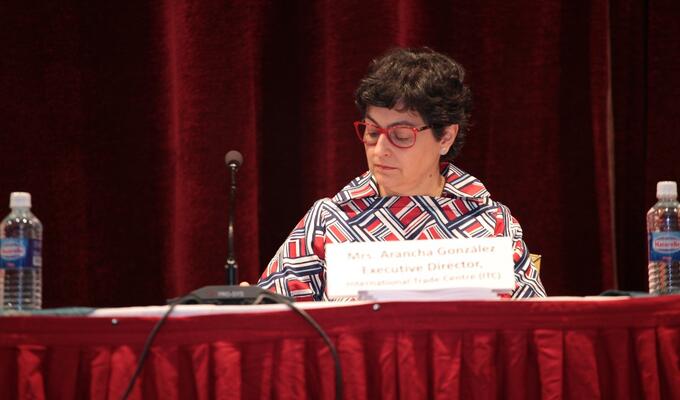

Official launch and ceremony of the strategic youth and trade development roadmap (SYDTR) and sector roadmaps
15 May 2018
Banjul, Gambia
Her Excellency Vice President of the Republic of The Gambia, Fatoumatta Tambajang
Hon Minister Dr. Touray,
Hon Minister Gomez
Cabinet Minsters
Ambassador of the European Union, Attila Lajos
Representatives from the Diplomatic Corps
Colleagues from the United Nations
Distinguished guests,
Ladies and Gentlemen,
Youth of The Gambia,
It is a great pleasure to be back here in The Gambia with you today. I feel as if I have never left. You are some of the most active users of social media I have ever seen and every day I get an insight into the work and tremendous progress that is happening here, through your posts, your videos and your experiences.
The Youth and Trade Roadmap that we are launching today is the latest symbol of the progress happening here on the ground and is an expression of the firm commitment of the International Trade Centre and other members of the United Nations family to work hand-in-hand with the new Gambia as it charts a course towards a more prosperous future.
Little over a year ago, we launched the Youth Empowerment Project, the YEP! The famous YEP! that is as well known in Geneva as it is here in Banjul! Several activities have already been initiated during this first year of implementation. The impact is already becoming visible, in the shape of vocational training programmes and support for young entrepreneurs. More importantly, we can see the promise for much more.
Today is an important milestone as we launch the Youth and Trade Roadmap.
The Gambia’s new government has made trade an important part of its plans for growth, democratic consolidation and creating jobs for the young people who make up the vast majority of the population.
Yet seizing this moment is not straightforward. Policymakers facing myriad demands and business needs must confront complex questions. Questions like:
• How do we respond to young people’s aspirations?
• How do we address skills gaps?
• How do we set priorities?
• How do we develop competitive value chains? In which sectors?
• How do we ensure young people are integrated into these value chains?
• Who does what?
The YEP is about answering these questions. So is this Roadmap, which is intended to serve as a compass for the government to make trade work for the young women and men of The Gambia.
Before determining future policy and interventions, it was essential to develop an accurate snapshot of where The Gambia stood, in terms of the competitiveness of its enterprises, the capacities of the vocational training system, and mismatches between training curriculums and labour market needs. For this, we talked to 110 companies from the Kombos to Basse using ITC’s SME Competitiveness Survey. We consulted producers, exporters, technical agencies, training institutions, representatives from the ministries, and of course, hundreds of students and young entrepreneurs.
The results have shaped the design of the Youth and Trade Roadmap.
The roadmap is, in sum, an action agenda for how The Gambia can use trade to create opportunities for youth by improving productivity and production quality, bolstering technical and vocational skills, facilitating entrepreneurship, and fostering new market connections.
The roadmap identifies three priority sectors - nuts and agro-processing, tourism, and information and communication technologies – and sets out precise activities, designed by Gambian stakeholders, to encourage value addition in each of them.
The roadmap directly supports The Gambia’s National Development Plan to empower youth and is focused connected to the needs and demands of the market.
I want to take a moment to briefly describe some of the initiatives that have been rolled out under the Youth Empowerment Project since February 2017:
• YEP has worked to reinforce training programmes in areas that offer opportunities for youth employment and self-employment. These range from agropreneurship, hospitality and community-based tourism services to mobile phone repair and solar and-satellite installation. It’s a wide range but they all have one thing in common. They are practical and market-oriented - offering maximum prospects for graduates to find a job or create one.
• So far YEP has already supported skills development and training of 1300 youths. This year, we have established a results-based competitive funding model, the Skills for Youth Employment Fund to further strengthen the linkage between training and employment, In 2018, The SkYE Fund, as it is known, aims to equip 1,000 more Gambian youth with market-relevant technical and vocational skills in partnership with local training institutions.
• To encourage youth entrepreneurship, the project has bolstered mentoring support and developed a mini-grant scheme with the National Association of Cooperative Credit Unions of The Gambia (NACCUG) to facilitate access to finance for young entrepreneurs in rural areas. ITC’s goal here is to help young people transform from job seekers to creators of sustainable jobs through trade and connections to value chains.
• Finally, YEP has already made significant strides in strengthen MSMEs. We are working already with 250 companies to strengthen the competitiveness. This includes support to meet, quality and market compliance of products and services, improve productivity, develop new products and services and connect to market opportunities. Reinforcing the capacities of micro, small and medium sized companies will have a crucial and lasting effect on job creation.
None of this would have been possible without the excellent partnership that ITC has with all the stakeholders that are present here today, and those who could not come but played critical roles in this process.
I would like to commend President Adama Barrow for officially endorsing the Youth and Trade Roadmap. This represents an important step in the reform process your government has championed.
I would also like to reiterate our gratitude to the Ministry of Trade, Industry, Regional Integration and Employment and the Ministry of Youth and Sports for their trust and continuous support in delivering YEP. Also to the European Commission and its delegation here in Banjul, who also put their trust in ITC.
Ladies and gentlemen, the last two years have been a sad wakeup call for the international community about the importance of economic opportunities for young people. The tragic images from the Mediterranean brought attention to the risks people were willing to take, whether to flee conflict or simply in search of a better future.
The Africa Competitiveness Report estimates that Africa will need to create 450 million new jobs by 2035, while it is on track to generate only 100 million. This is a recipe for broken dreams, individual frustration, social unrest, and irregular migration.
It is crucial that we put our efforts together to create jobs for youth and implement actions at all levels – from the local to the national, regional and global levels. This cause is at the heart of the Sustainable Development Goals. ITC reaffirms its commitment and actions to youth economic empowerment in The Gambia and elsewhere.
We at ITC are proud to have assisted in the development of this Roadmap. But the Roadmap itself is just an initial step. We must work together to move it from words to action. YEP has already put the wheels in motion. But this is the beginning. Scaling up impact requires scaled up commitment and partnerships.
As I conclude, I therefore call on all national stakeholders – public and private, youth associations, the diaspora - and all development partners who have come together in the design of the Youth and Trade Roadmap to continue working together on its full implementation. With the combined efforts of all, youth, women, “uncles” and “aunties”, and newly created sector Core Teams, the Gambian youth will reap the benefits these roadmaps envision.
I am also pleased to announce that other development partners are rallying behind this call for support. The Gambia Technical Training Institute (GTTI), the German technical assistance agency, GIZ and ITC will sign a new partnership agreement after the launch to support the implementation of the Youth and Trade Roadmap by improving skills training in rural areas and facilitating access by young vulnerable Gambians as the main beneficiaries
Today, I, for one, pledge ITC’s continued support to The Gambia in its journey towards “progress, peace and prosperity” – and to do so in line with the priorities established by President Barrow’s government for youth.
At this important moment of launching the roadmap let me give the last word to the youths here with us. I want you to answer the following question
TUKI WALA TEKKI FII ?
Thank you.



